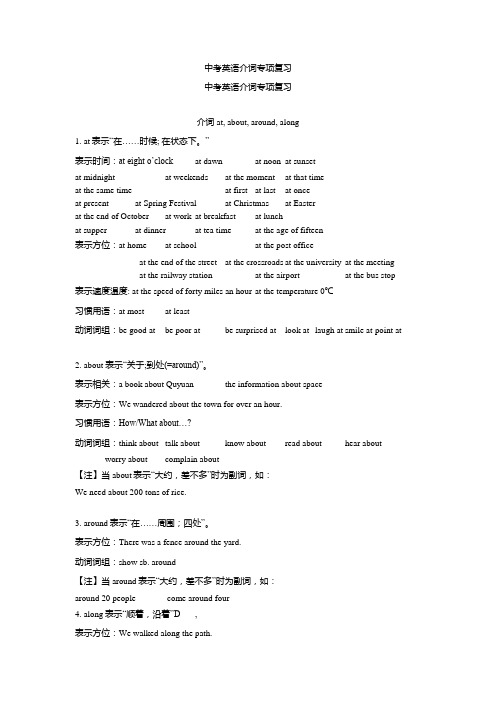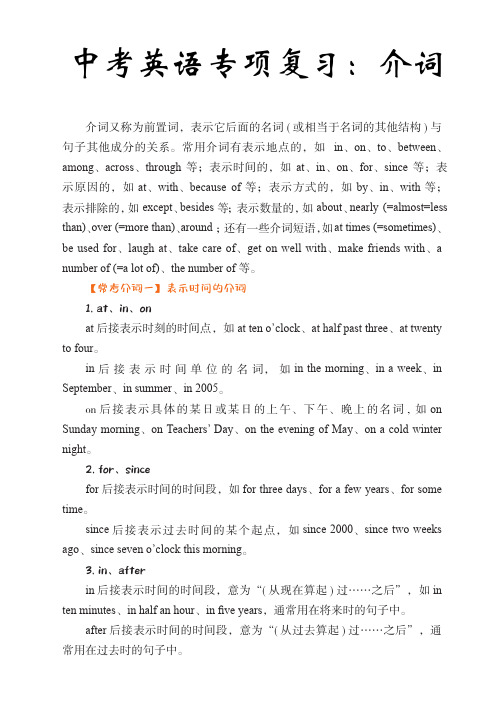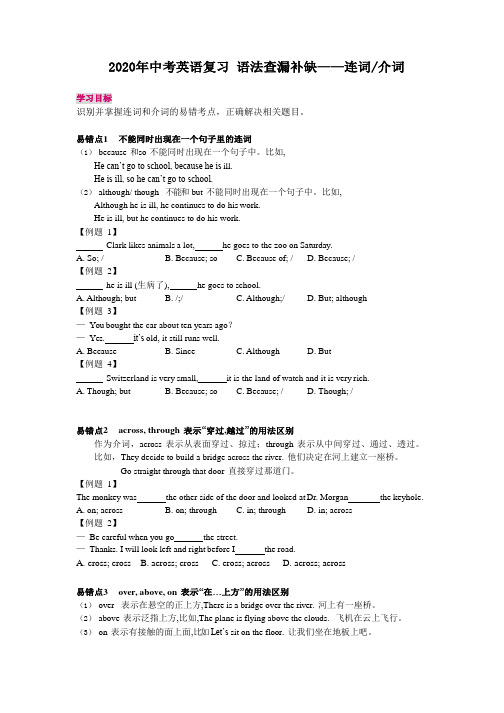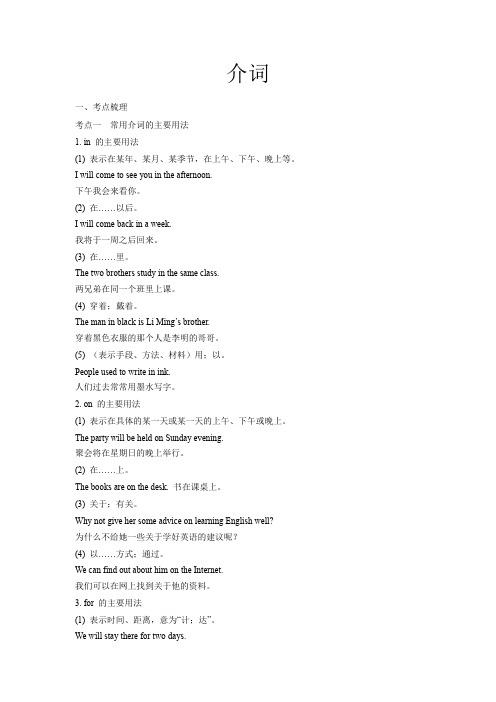中考英语介词复习(无答案)
- 格式:doc
- 大小:165.00 KB
- 文档页数:10

中考英语介词专项复习中考英语介词专项复习介词 at, about, around, along1. at表示“在……时候; 在状态下。
”表示时间:at eight o’clock at dawn at noon at sunsetat midnight at weekends at the moment at that timeat the same time at first at last at onceat present at Spring Festival at Christmas at Easterat the end of October at work at breakfast at lunchat supper at dinner at tea time at the age of fifteen表示方位:at home at school at the post officeat the end of the street at the crossroads at the university at the meetingat the railway station at the airport at the bus stop 表示速度温度: at the speed of forty miles an hour at the temperature 0℃习惯用语:at most at least动词词组:be good at be poor at be surprised at look at laugh at smile at point at2. about 表示“关于;到处(=around)”。
表示相关:a book about Quyuan the information about space表示方位:We wandered about the town for over an hour.习惯用语:How/What about…?动词词组:think about talk about know about read about hear about worry about complain about【注】当about表示“大约,差不多”时为副词,如:We need about 200 tons of rice.3. around表示“在……周围;四处”。

中考英语专项复习:介词介词又称为前置词,表示它后面的名词 ( 或相当于名词的其他结构 ) 与句子其他成分的关系。
常用介词有表示地点的,如 in、on、to、between、among、across、through 等;表示时间的,如 at、in、on、for、since 等;表示原因的,如 at、with、because of 等;表示方式的,如 by、in、with 等;表示排除的,如 except、besides 等;表示数量的,如 about、nearly (=almost=less than)、over (=more than)、around ;还有一些介词短语,如at times (=sometimes)、be used for、laugh at、take care of、get on well with、make friends with、a number of (=a lot of)、the number of 等。
1. at、in、onat 后接表示时刻的时间点,如 at ten o’clock、at half past three、at twenty to four。
in 后 接 表 示 时 间 单 位 的 名 词, 如 in the morning、in a week、in September、in summer、in 2005。
on 后接表示具体的某日或某日的上午、下午、晚上的名词 , 如 on Sunday morning、on Teachers’ Day、on the evening of May、on a cold winter night。
2. for、sincefor 后接表示时间的时间段,如 for three days、for a few years、for some time。
since 后接表示过去时间的某个起点,如 since 2000、since two weeks ago、since seven o’clock this morning。

2020年中考英语复习语法查漏补缺——连词/介词学习目标识别并掌握连词和介词的易错考点,正确解决相关题目。
易错点1不能同时出现在一个句子里的连词(1)because 和so 不能同时出现在一个句子中。
比如,He can’t go to school, because he is ill.He is ill, so he can’t go to school.(2)although/ though 不能和but 不能同时出现在一个句子中。
比如,Although he is ill, he continues to do his work.He is ill, but he continues to do his work.【例题1】Clark likes animals a lot, he goes to the zoo on Saturday.A. So; /B. Because; soC. Because of; /D. Because; /【例题2】he is ill (生病了), he goes to school.A. Although; butB. /;/C. Although;/D. But; although【例题3】—You bought the car about ten years ago?—Yes. it’s old, it still runs well.A. BecauseB. SinceC. AlthoughD. But【例题4】Switzerland is very small, it is the land of watch and it is very rich.A. Though; butB. Because; soC. Because; /D. Though; /易错点2across, through 表示“穿过,越过”的用法区别作为介词,across 表示从表面穿过、掠过;through 表示从中间穿过、通过、透过。

2024年中考英语专题复习精练—介词中考真题1.(2023·青海·统考中考真题)The four pandas in Chongqing Zoo were born on the same day _______ 2019.A.on B.at C.in【答案】C【详解】句意:重庆动物园的四只大熊猫于2019年同一天出生。
考查时间介词。
on后接具体某一天等;at后接具体时刻等;in后接具体年月等。
根据“2019”可知此处是在2019年,用介词in。
故选C。
2.(2023·湖北十堰·统考中考真题)—________ my surprise, the restaurant is a actually very nice.—The service is also great.A.In B.At C.On D.To【答案】D【详解】句意:——让我惊讶的是,这家餐厅实际上非常好。
——服务也很棒。
考查介词辨析。
in在里面;at在;on在上面;to到。
to one’s surprise“令某人惊讶的是”,固定短语,故选D。
3.(2023·山东东营·统考中考真题)Bees (蜜蜂) can help plants grow. ________ bees, we wouldn’t have enough food.A.From B.Like C.Except D.Without【答案】D【详解】句意:蜜蜂能帮助植物生长。
没有蜜蜂,我们将没有足够的食物。
考查介词辨析。
From从;Like像;Except除了……之外;Without没有。
根据“Bees can help plants grow.”可知,没有蜜蜂,植物生长慢,我们将会没有足够的食物。
故选D。
4.(2023·江苏徐州·中考真题)No one helped me. I did it all ________ myself.A.for B.of C.by D.about【答案】C【详解】句意:没有人帮我。

英语中考归纳复习专题:介词【介词】介词是一种虚词,表示名词、代词等与其他词的关系,不能单独作句子成分。
介词后面一般有名词、代词或动名词等作它的宾语(如果是人称代词,则要用宾格),介词和它的宾语构成介词短语,在句中作状语、表语或定语等。
【时间介词】1.at,in与on第 1 页共27 页2.from,since与for第 2 页共27 页3.before与after第 3 页共27 页4.until,during与by第 4 页共27 页【考点训练1】1.China successfully hosted the Belt and Road Forum _____ May,2017. ()A.onB.inC.byD.at2.We usually have the first class ___ 8:00 in the morning. ()A.inB.onC.atD.from3.More and more young people go skating _____ winter. ()A.atB.inC.onD.to4.I’ve had this mobile phone ___ three years. ()第 5 页共27 页A.byB.fromC.forD.since5.His grandfather has been ill ___ last year. ()A.forB.sinceC.fromD.after6.___ April 22nd,people around the world celebrate Earth Day in different ways. ()A.InB.AtC.OnD.For【方位介词】1.at与in第 6 页共27 页2.in,on与to第7 页共27 页【图解助记】3.over,above,on,under与below第8 页共27 页【图解助记】4.其他方位介词第9 页共27 页【考点训练2】1.—Where is Mary flying?—She is flying to France soon.She will arrive ___ Paris on the morning of July 2. ()A.toB.atC.inD.on2.I can’t see Lucy because she is ___ the tree. ()A.in front ofB.behindC.next toD.beside3.Russia lies ___ the north of China. ()A.onB.toC.inD.at第10 页共27 页4.The workers will build a new railroad ___ the two cities. ()A.amongB.inC.betweenD.at5.—Oh,my God! I’ve left my keys in the room.I’ll have to get in ___ the window. —It’s dangerous.You’d better wait for your dad to come back. ()A.past B.over C.across D.through【方式介词】第11 页共27 页考点训练3】用适当的方式介词填空。

介词一、考点梳理考点一常用介词的主要用法1. in 的主要用法(1) 表示在某年、某月、某季节,在上午、下午、晚上等。
I will come to see you in the afternoon.下午我会来看你。
(2) 在……以后。
I will come back in a week.我将于一周之后回来。
(3) 在……里。
The two brothers study in the same class.两兄弟在同一个班里上课。
(4) 穿着;戴着。
The man in black is Li Ming’s brother.穿着黑色衣服的那个人是李明的哥哥。
(5) (表示手段、方法、材料)用;以。
People used to write in ink.人们过去常常用墨水写字。
2. on 的主要用法(1) 表示在具体的某一天或某一天的上午、下午或晚上。
The party will be held on Sunday evening.聚会将在星期日的晚上举行。
(2) 在……上。
The books are on the desk. 书在课桌上。
(3) 关于;有关。
Why not give her some advice on learning English well?为什么不给她一些关于学好英语的建议呢?(4) 以……方式;通过。
We can find out about him on the Internet.我们可以在网上找到关于他的资料。
3. for 的主要用法(1) 表示时间、距离,意为“计;达”。
We will stay there for two days.我们将在那里逗留两天。
(2) 表示“当作;作为”。
I’d like some bread and milk for breakfast.我想要些面包和牛奶当早餐。
(3) 表示理由或原因,意为“因为;由于”。
The match is cancelled for the heavy rain.比赛因大雨而取消。
(英语)中考必刷题英语介词题含解析一、初中英语介词1.More and more people in Qingdao go to work _________subway now.A. withB. onC. inD. by【答案】D【解析】【分析】句意:现在越来越多的青岛人乘地铁去上班。
A. with 用;B. on 在---上;C. in 在---里;D. by乘;根据on/in+the+交通工具,by+交通工具;故选D。
【点评】考查介词辨析。
根据固定搭配选出正确答案。
2.The high-speed train Qingdao and Beijing travels faster now. The train ride takes only about three hours.A. fromB. amongC. inD. between【答案】 D【解析】【分析】句意:现在青岛和北京之间的高速列车跑得更快了。
火车车程只有大约三个小时。
from 从;among 在……中;in 在……里;between 在……之间;根据后面的and,可知是固定搭配,between…and…,在……和……之间,故选D。
【点评】此题考查介词辨析。
根据句意和上下文的联系确定所使用的介词。
3.If the singer to Zigong September 20th, please call me.A. will get; onB. gets; onC. gets; in【答案】 B【解析】【分析】句意:如果这个歌手在9月20号来自贡的话,请给我打电话。
本题考查动词时态及介词。
if 引导的条件状语,时态要遵从主将从现,从句的主语是第三人称单数,谓语动词用第三人称单数;表示具体某一天用介词on,故选B。
【点评】此题考查一般现在时和介词用法。
注意if引导的条件状语从句的时态。
4.—Shall we stop and wait for others?—Sounds good. I think they will catch up______ a few minutes.A. duringB. afterC. forD. in【答案】 D【解析】【分析】句意:——要不我们停下来等别人好吗?——听起来不错。
语法专题三、介词(常考)考点1 时间介词①in,after,later表示时间的区别in +时间段,用于将来时,表示“过……后”。
He will come back in an hour.after+一段时间,用于过去时,表示“在……以后”。
After an hour,he came back.after+时间点,用于将来时,表示“在……以后”。
He will come back after 5 o'clock.时间段+later,常用于过去时,表示“在……之后”。
An hour later,he came back.②in,on,at表示时间的区别in 主要表达年、月、季节、年代、世纪;泛指上午、下午、晚上。
➢in spring在春天in February在二月in the 21st century在21世纪➢We have four lessons in the morning. 我们上午有四节课。
on 主要表示星期、日期或具体的某一天;特指具体某一天的上午、下午、晚上用on。
➢on Monday在星期一on May 1st在五月一号on Labor Day在劳动节➢We have two lessons on Friday afternoon. 我们周五下午有两节课。
at 表示某一时刻,用于具体时间点前,或正午和午夜前。
➢at 7:00在七点at noon 在正午at night在晚上/在午夜➢We start classes at eight o’clock every morning. (注意every, this, last, next前不加介词)我们每天早上八点上课。
(2021·北京市·历年真题)Space Day of China falls ______ April 24th every year.③ A. on B. by C. at D. in④for,since 表示时间的区别(现在完成时的标志词)for +时间段➢I have lived here for 10 years. 我已经住在这里十年了。
介词知识讲解一:单项选择题之介词。
一、考纲解读定搭配。
由于每个介词都可以表达不同的含义,且无规律可循,因此在备考时考生应该注意收集介词和各类词搭配构成的短语。
二、考点一时间介词延续性动词:live,run,stay,clean,play,hold,watch,teach,read,study,teach,eat,drink,write,danc e, sing,smoke瞬间性动词:open,stop,like,love,die,win,close,shot,begin,start enter,finish(一)、时间介词和地点介词——真题操练1、_____ March 8, 2014, the flight of Malaysia Airlines MH370 got lost with 239 passengers ___ it.A.On; inB. To; onC. At; inD. At; on2、The foreigners arrived _____ Shanghai____ night.A.at; atB. in; atC. in; inD. at; in3、Connie arrived _____ the village _____ a snowy night.A.at; onB. at; inC. in; atD. in; on4、They usually go shopping _____ their lunch break.A. againstB. amongC. betweenD. during5、——When and where were you born?——I was born_____ October 1st, 1998_____ Suzhou.A.on; onB. in; onC. in; inD. on; in(二)、时间介词——真题操练1、——What will you do ____ the summer holiday?——I think I shall watch London Olympic Games. It will ____ in August.A.during; be heldB. at; holdC. during; holdD. at; be hold2、—Do you often go swimming ____ Sunday morning?—Yes. Why not ____ with me this Sunday?A.on; goB. in; to goC. on; goingD. in; going3、I was born___ a Friday morning.A.inB. onC. atD. for4、Wow!Ten students in our class will celebrate their fourteenth birthdays ___ October.A. inB. onC. atD. to5、My friend, Henry, was born _____ June 10th, 1997.A.inB. onC. atD. for6、Welcome to our hotel ! I hope you’ll have a good time____ your stay here.A. afterB. duringC. withD. since7、Both of my parents were born___ 1970.A. inB. onC. atD. to8、—When was you born?—I was born____ a cold winter morning in 1996.A.inB. onC. at时间介词真题操练:10、I hear our teacher will be back____ three weeks’ time.A. atB. inC. forD. after三、考点二地点介词(一)across, through, over, past 的区别1、The sweet smell of the flowers in the garden comes in _____ the open windows making us feel in a good mood.(心情)A.on;B. withC. through2、The old man is a good swimmer, and even now he always swims ____ the Pearl River after supper.A. overB. throughC. toD. across(二)地点介词真题操练1、—Why are you standing, Alice?—I can’t see the blackboard clearly. Two tall toys are sitting ___ me.A.behind;B. next toC. betweenD. in front of2、Wushu is becoming more and more popular_____ westerners.A. amongB. betweenC. inD. within3、——Is this your father home?——No, he’s working late____the office.A. onB. atC. ofD. to四、考点三方式介词(一)in, with 和by表示“用”时的区别(二)with 和without 的区别(三)方式介词真题操练1、I couldn’t do it ____ your great help. Thanks a lot.A. withB. withoutC. forD. to2、—Kelly, who’s the girl ____ glasses in the photo?—It’s me. I used to wear glasses and have long hair.A.byB. ofC. onD. With3、It’s time ____ the weather report. Turn on the radio, please.A. toB. inC. atD. for4、Students are encouraged to share their learning experience ____ their classmates.A. toB. inC. atD. with5、You can improve your English ____ practicing more.A. byB. withC. ofD. in6、____ 7, Bruce won second prize in the piano competition.A. In;B. At;C. OnD. for(四)by, in 和on表示旅行方式的区别方式介词真题操练:7、I like going to school ____ my bike.A. inB. onC. byD. at8、After the final exam, Changchang, ____ her mother, is going to travel to Canada instead of staying at home all the time.A. andB. withC. as well9、Bill has made great progress ____ the help of his teachers.A. forB. withC. under10、—Who did you go to the movies ____?—Nobody. I went alone.A.withB. aboutC. forD. from五、考点四常用介词的用法及辨析:(一)in和on的区别(二)表示地点的介词in, on和to的区别(三)after与behind区别两个词都有“在······后”之意,behind只表示位置方面的“在······之后”,不能表示时间,而after则表示时间方面的“在······之后”。
For examples:behind the school 在学校后面;after 5 o’clock 5点之后;after the house 在房子后面(四)、at 和to 表行为对象时的区别(五)、of 和in 用于最高级结构中的区别(六)、to的两种用法的区别(七)、常用介词辨析之真题操练1、Most people are_____ building a paper factory near here. They are worried the river will get polluted.A.forB. withC. againstD. beyond2、The boy looks nice____ white while the red sweater looks good ___ the girl.A.with; onB. in; onC. on; inD. in; with3、The Dragon Boat Festival in celebrated _____ different ways ____ the same time in different places every year.A.on; inB. in; atC. on; atD. on; at4、My aunt Jane tried her best to reduce her weight ____ 6kg.A.aboutB. atC. toD. by5、—Your bag looks the same____ mine.—Oh, really? It’s a gift____ my father.A.with; toB. with; fromC. as; onD. as; from6、The castle stands in a quiet place ____ the main road at the far end of the river.A.toB. forC. offD. out7、——This problems is far____ me; I am afraid I can’t work it out.——Don’t worry, we will help you.A beyond B. beside C. behind D. between8、The exhibition shows_____ 200 paintings of young, exciting artists from France.A. atB. withC. aboutD. in9、She had to sell the house even though it was ____ her own wishes.A. forB. aboveC. againstD. on10、——Can I join Oxfam Trail-walker?——Only if you are ___ eighteen.A. overB. underC. blowD. on(八)、for, to 和towards的区别1、She always wants to do the job which she has been trained ____.A. forB. byC. onD. off2、—— Excuse me. Could you tell me the way to the People’s Hospital?—— Walk along this street _____ the end and you’ll find it on your left.A. inB. byC. toD. at3、—— What did you get ____ your birthday,Tony?—— An iPad3, from my aunt.A. toB. atC. withD. for(九)、but, besides 和except的区别1、—All the workers went home yesterday _____ Mr. White. Why?—Because he was on duty.A.exceptB. besidesC. except forD. beside2、—Who else do you know at the party ____ Jim and Tom?—Lucy and Lily.A. exceptB. besidesC. except forD. beside(十)、of sb. 与for sb. 的区别(1)of sb. “对于(某人)”用于 It is +adj. +of sb. to do sth.句型中,形容词为clever, kind, nice 等描述人物性格特征的词,of 后的人物与形容词有主表关系。